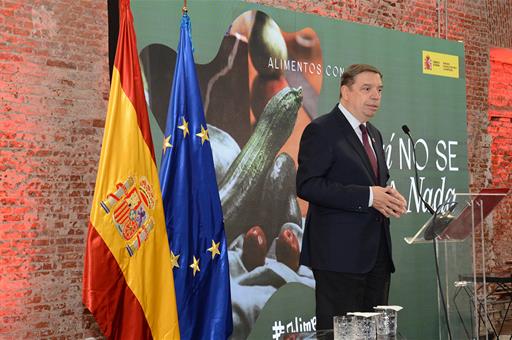At the presentation of the campaign "Nothing is thrown away here. Food with 7 lives"
Luis Planas: At a time like the present, it is an ethical duty to prevent food waste
News - 2022.12.16
The Minister for Agriculture, Fisheries and Food, Luis Planas, today called on society as a whole to take responsibility to prevent food waste, which is an ethical duty, especially in such complicated times as the present with rising prices and difficulties in the supply of agricultural products due to the war in Ukraine.
The minister took part today in the presentation of the campaign "Nothing is thrown away here. Food with 7 lives", launched within the framework of the Food from Spain strategy to raise societal awareness of responsible food consumption and the need to reduce food waste. Luis Planas has highlighted the importance of the promotional campaigns launched by the ministry, as they contribute to giving visibility to the quality and variety of Spanish foodstuffs and to strengthening the growth of the Spanish agri-food sector.
The ministry is promoting the law on the prevention of food losses and food waste, currently in parliamentary procedure and planned to enter into force in the first half of 2023, a pioneering regulation inspired by the government's main lines of promoting social justice, environmental protection and economic growth. Reducing waste, he underlined, will promote a circular, sustainable, low-carbon and more competitive economy. He reiterated that the Government of Spain is committed to the Sustainable Development Goals of the United Nations 2030 Agenda, which includes the aspiration to halve food waste by that year.
Data for the period April-September 2022 show that the total volume of household food waste has decreased by 5% compared to the same period last year, with a total of 586.3 million kilos.
This decrease is due to a reduction in consumption rather than better food management, as the waste rate of unused products is in fact increasing (in spring-summer 2021 we wasted 4.2% of what we bought, and in spring-summer 2022 the figure was 4.3%). In terms of waste outside the home, 10.5 million kilolitres was wasted this spring-summer half-year 2022. This is 17.6% lower than in the same period in 2021.
The data in the Report on Food Waste in Spain 2021, produced by the Ministry of Agriculture, Fisheries and Food, show that each Spaniard threw away an average of 28.21 kilos/litres of food, which is the lowest figure for the last five years and 2.72 kilos/litres less than in 2020. The household waste rate, however, is similar to the previous year, with 4.2% of food purchased being thrown away unconsumed, one tenth less than in 2020.
The report attributes the decline in food waste and better food use to a change in habits following the restrictions that occurred in 2020 due to the COVID-19 pandemic. With the end of confinement, less cooking is done at home, and in fact the volume of food purchased for home consumption has decreased by 7.2%. In contrast, food consumption outside the home recovered over the course of 2021, with an increase of 10.4%.
Likewise, it is considered essential to carry out training and awareness-raising activities for citizens not only to visibilise the importance of this fight but also to provide them with options that will enable them to behave more sustainably. For this reason, today's campaign appeals to pride in Spanish products, to value the efforts of the entire chain and to make the most of foodstuffs. In this regard, the minister encouraged the recovery of the value we give to food and the work of those who produce it, because what has value should not be thrown away.
The law on the prevention of food losses and food waste aims to regulate the preferential use of food for human consumption, favouring donation, and seeks to raise society's awareness of the need to reduce food wastage. To this end, the standard will promote good practices from primary producers at the harvesting and collection stage, to consumers, whether at home or in bars and restaurants, because food waste occurs at all stages of the food chain.
Within this framework, food chain actors must have a loss and waste prevention plan that facilitates self-diagnosis of their production processes, identifies where food losses occur, establishes measures to minimise them, and allocates them to other uses, for which a hierarchy of priorities is established.
Non official translation





